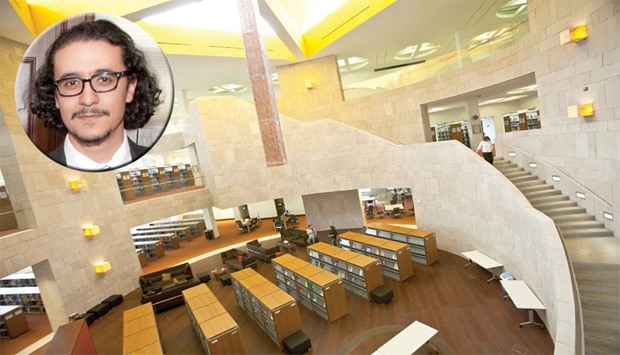As part of its public lecture series intended to create a bridge between scholars of science and technology fields in the Middle East and Islamic World, Qatar National Library (QNL) is organising a lecture on ‘The History of Science and Technology in the Middle East and Islamic World’.
To be presented by Ahmed Ragab, professor of History of Science from the Science, Religion and Culture programme at Harvard University, USA, the lecture will highlight the golden age of Islamic sciences, the narratives of decline and Science and Technology in the modern Middle East and Islamic World.
Ahmed Ragab is the Richard T Watson Assistant Professor of Science and Religion at Harvard Divinity School, affiliate assistant professor at the department of the history of science, and director of the Science, Religion and Culture programme at Harvard Divinity School.
Ragab is a physician, historian and a scholar of science and religion. He received his MD from Cairo University School of Medicine in 2005 and his PhD in History and Philosophy of Science from L’École Pratique des Hautes Études in Paris.
He joined Harvard Divinity School in July 2011 as the first Richard T Watson Assistant Professor of Science and Religion at Harvard Divinity School. In 2012, Ragab inaugurated the Science, Religion and Culture programme at Harvard Divinity School, which he continues to direct.
Ragab’s work spans various fields and disciplines. He studies the history of science and medicine, science and religion and the development of cultures of science and cultures of religion in the Middle East and the Islamic World. He also studies various questions related to science and religion in the US with a focus on US Muslim communities.
His research on the history of science, medicine and culture in the Islamic world includes history of medieval Islamic hospitals.
Ragab also worked on sex and gender differentiation in medical thought in the region, on the development of anatomy and dissection and their relation to religious practices in the Ottoman context. He investigates medical thinking and physician-patient encounters in the medieval and early modern context.
In his most recent book projects, Ragab investigates the history of prophetic medicine, the medieval as well as the modern Islamic world.
Prophetic medicine is a body of literature that collects sayings by Prophet Muhammad (PBUH), which included medical and health-related pronouncements and advice.
Ragab’s work investigates the rise of this literature, the role it played in the history of medical thought and practice and in the development of prophetic traditions, and its resurgence, the new developments related to this resurgence, and the social and political significances of this literature.
In another book project, Ragab investigates the development of views on science and Islam from the early 19th century. The project looks at how debates on science and Islam coincided with the introduction of modern science in the region and allowed for recasting the meanings of both scientific and religious knowledge.
Ragab explains the historicity of the relationship of science and Islam and the role played by the coupling of science-and-Islam in the formulation of new scientific discourses in the region.
He was trained in epidemiology and medical sociology, and worked on infectious and epidemic diseases.
Ragab has a special interest in gender, ethnic, and religion-based disparities in disease burden, and in the gender, ethnic, and religious dimensions of treatment modalities and healthcare policy.
He was elected a member of the Commission on History of Science and Technology in Islamic Societies and a member of the International Society for Science and Religion. The two-hour QNL public lecture will start at 4pm on February 1 at Georgetown University in Education City.

The two-hour QNL public lecture will be held on February 1 at Georgetown University in Education City. INSIGHT: Ahmed Ragab will explain the historicity of the relationship of science and Islam.
